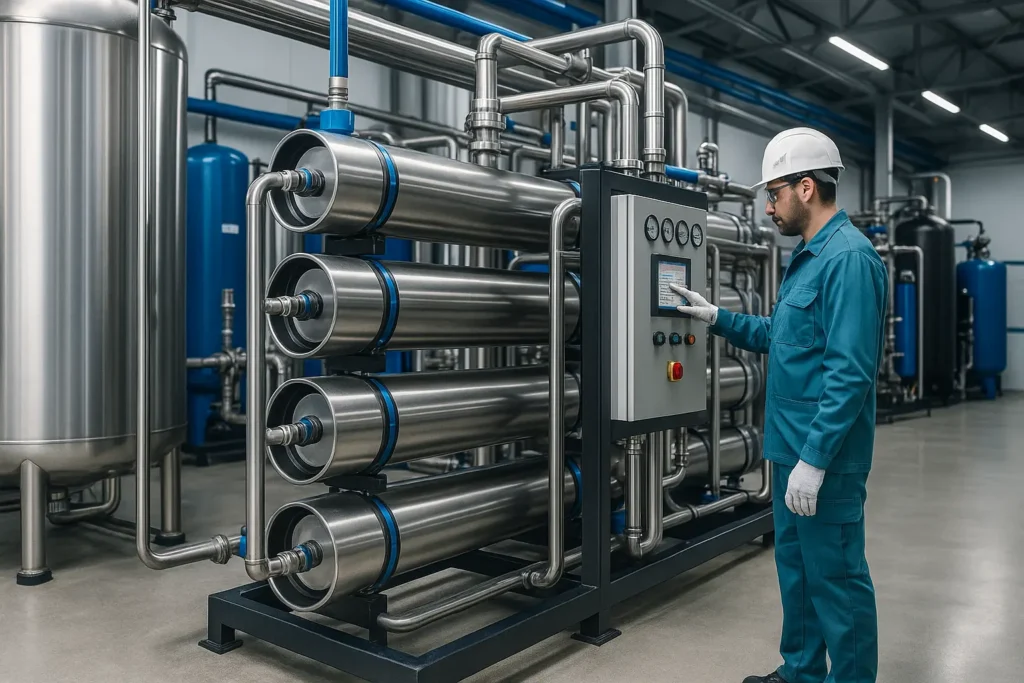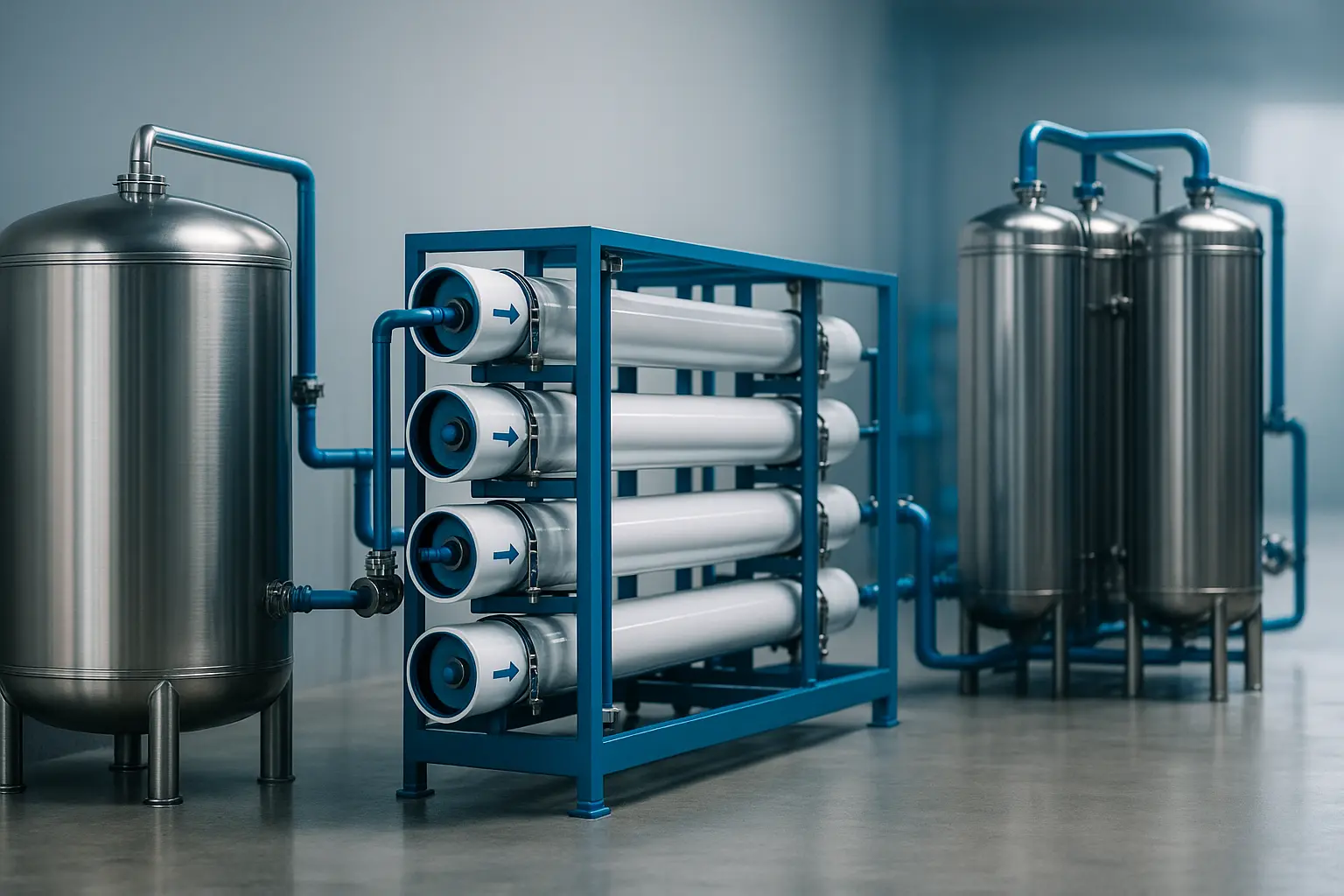This page is your practical reference for an industrial reverse osmosis water treatment system: what it is, how the process runs from pretreatment to post-treatment, and how to size, operate and maintain the skid. If you are planning, upgrading or troubleshooting a reverse osmosis water treatment system, start here.

1) What Is a Reverse Osmosis Water Treatment System?
A reverse osmosis water treatment system applies pressure above the osmotic pressure so water passes a semi-permeable membrane while dissolved salts and many organics are rejected. RO is the core desalting step that feeds DI polishing, boiler makeup, lab water and beverage lines.
2) Reverse Osmosis Water Treatment System Process Flow
Pretreatment → RO purification → Post-treatment is the most stable sequence for a reverse osmosis water treatment system:
- Pretreatment prepares feedwater for the membrane window and protects the skid.
- RO purification splits feed into permeate and concentrate within membrane vessels.
- Post-treatment finishes quality and keeps it stable through storage and a sanitary loop.
3) Pretreatment (MMF / Carbon / Softening / Cartridge)
Proper pretreatment is the cheapest insurance for any reverse osmosis water treatment system.
- Multimedia (sand) filter reduces turbidity and SDI to protect membranes.
- Activated carbon adsorbs organics/odor and removes residual chlorine.
- Softening or antiscalant dosing controls hardness scaling (Ca/Mg).
- Cartridge filter (~5 μm) provides a final particle barrier ahead of the skid.
Related items: filter housings & cartridges, activated carbon, ion-exchange resin, dosing pumps; stainless-steel vessels & tanks: SS process & storage tanks.
4) RO Skid: Membranes, Pressure Vessels & High-Pressure Pump
The skid of a reverse osmosis water treatment system includes a high-pressure pump, membrane elements in pressure vessels, and instrumentation for conductivity, temperature, flow and differential pressure (ΔP). Set PLC/HMI interlocks for low pressure, high conductivity and tank levels.
5) Post-Treatment: Polishing, Storage & Distribution
- Polishing — add EDI or mixed bed, UV and 0.2 μm final filters to meet specifications.
- Storage & loop — prefer a stainless-steel storage/contact tank with vent filtration and a sanitary recirculation loop.
Background reading: EPA drinking water · NSF treatment claims
6) Design & Sizing Notes
- Feed window — design for turbidity/SDI, residual chlorine/organics, hardness and temperature.
- Recovery vs scaling — conservative recovery improves stability; use antiscalant/softening or run two-stage RO.
- Materials — UPVC/PP upstream; SS316L and sanitary plastics downstream as required.
- Monitoring — normalize flow/ΔP/conductivity; define CIP triggers and membrane inspection steps.
These rules keep a reverse osmosis water treatment system predictable across seasons and shifts.
7) Operations, Maintenance & Emergency
Daily O&M
- Log permeate conductivity, pressures and flows; investigate anomalies promptly.
- Replace the cartridge filter on schedule and keep chemicals (salt/antiscalant) filled.
- After outages, verify power/water stability and restrict unauthorized operation.
Emergency
- For serious leaks, shut feed and power; isolate the skid.
- If quality drifts or ΔP rises rapidly, schedule CIP; if cleaning fails to recover, replace affected elements.
8) Consumables & Replacement Cycles (Typical)
- Sand media: ~10–24 months; Activated carbon: ~10–12 months; Softener resin: ~10–12 months.
- Cartridge filter: ~3–6 months (or by ΔP); RO membranes: ~12 months or per vendor/site conditions.
Intervals vary by feedwater and operations; base acceptance on on-site data and vendor guidance.
9) Typical Applications
A reverse osmosis water treatment system serves electronics and lab water, food & beverage, hotels and schools, boiler makeup, potable polishing and reuse/ZLD projects.
10) Summary & Next Steps
Specify pretreatment carefully, run conservative recovery and monitor normalized KPIs—this keeps your reverse osmosis water treatment system efficient, compliant and easy to maintain.
11) Purchasing Checklist (BOM) + CTA
- Pretreatment: MMF, carbon, softening or antiscalant, 5 μm cartridge filters
- RO skid: high-pressure pump, vessels/elements, flow/pressure/temperature instruments, PLC/HMI
- Post-treatment: EDI or mixed bed, GAC, UV, 0.2 μm final filter
- Storage & loop: SS storage/contact tanks, recirculation pump, online conductivity/TOC as needed
- Accessories & consumables: RO membranes & housings, dosing pumps, activated carbon, resin, filter cartridges

